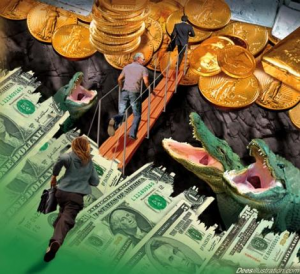 The decline of the dollar is being followed with interest by America’s rivals around the world. Currently, the greenback is at three year lows against key competitor currencies such as the Euro and the Swiss franc. It’s setting new records for lows against the reminbi (which doesn’t even trade freely!) and even Brazilian reals and Russian rubles are becoming preferred by traders as a transaction currency. Rivals big and small are indicating that they have had enough with dealing with the dollar – they want a new reserve currency for the world.
The decline of the dollar is being followed with interest by America’s rivals around the world. Currently, the greenback is at three year lows against key competitor currencies such as the Euro and the Swiss franc. It’s setting new records for lows against the reminbi (which doesn’t even trade freely!) and even Brazilian reals and Russian rubles are becoming preferred by traders as a transaction currency. Rivals big and small are indicating that they have had enough with dealing with the dollar – they want a new reserve currency for the world.
Even The UN Says: Replace The Dollar
The idea of replacing the dollar with a new reserve currency is hardly new. The UN Conference on Trade & Development first drafted a serious proposal in 2009, according to The Telegraph. Though it was considered radical in some circles, major players like Russia and China backed it. The report from the international body merely reinforced what they had been saying for years – the dollar was being given too much power relative to its actual strength.
China Backs It’s Own Currency
As an alternative to the dollar, China has been promoting its own reminbi. Given the vast network of trading partners it has around the world, the reminbi is involved in just as many transactions as the dollar. The Chinese are at a significant disadvantage having to put everything into dollars and then back again to close deals, and they are tired of suffering through the dollar’s declines.
HSBC economist Qu Hongbin supports a global role for the Chinese currency, noting that some $2 trillion is transacted in reminbi already. He points out that the internationalization of the remnibi is a major policy position for the current International Congress in China. The more the U.S. economic woes mount, the more attractive the reminbi looks as a reserve currency option.
Gold A Major Reserve Currency Contender
Of course, the Chinese reminbi is not the only strong contender as a new reserve currency. Many economists prefer to back gold – not because they love the yellow metal (so hard to manipulate) but because the Chinese government keeps a tight fist on the reminbi’s exchange rate. Thus, it’s hardly the free floating currency desired to give a solid reference point for value changes around the world.
The solidity of a bar of gold is one of its most attractive features as a reserve currency peg, and central banks world-wide have been quietly but steadily replacing their dollars with gold. In the first quarter of 2011, they dumped $9 billion in dollars in favor of an equal amount of gold, reports CNBC’s Catherine Holahan. U.S. Secure Coins CEO Jason Whitney notes that both China and Russia are leading the way in gold acquisition, with China aiming to increase its gold holdings from 1.7% of its reserves to nearly 10%. Russia, not wishing to be left behind, is briskly buying up gold coins and bars as well.
Learning To Love Local Currencies
Of course, not every nation has the deep pockets of Russia or China. This hasn’t stopped them from pursuing other options to ditch the dollar. Brazil, India, and South Africa have entered into an agreement with Russia and China to use local currencies over the dollar in international trades. This effectively cuts out the dollar from most emerging market transactions, undercutting its status as the world’s leading currency of exchange.
Local currencies have a lot going for them, especially in emerging market economies. They are generally appreciating in value, a sharp contrast from dollar based investments. Thus, traders get the double play of not having to use the US dollar and getting to enjoy a bit of value appreciation along the way.
Global Movement Growing
All of these major currency shifts away from the dollar simply represent the early stages of a global movement. Chatter about leaving the dollar is finally coalescing into action, but nothing has gone to extremes – yet. With the S&P downgrading America’s future economic outlook, Ben Bernanke and the Fed printing money, and Congress spending far more than the tax rolls, Americans need to seriously consider what might happen as this global movement away from the dollar as a reserve currency picks up steam.
 Off The Grid News Better Ideas For Off The Grid Living
Off The Grid News Better Ideas For Off The Grid Living



